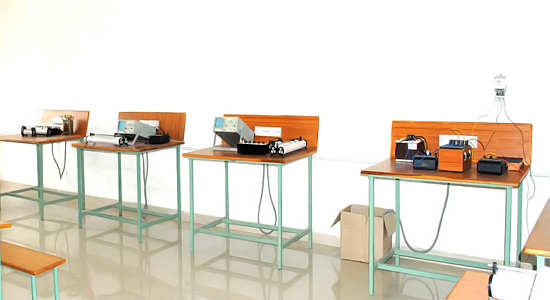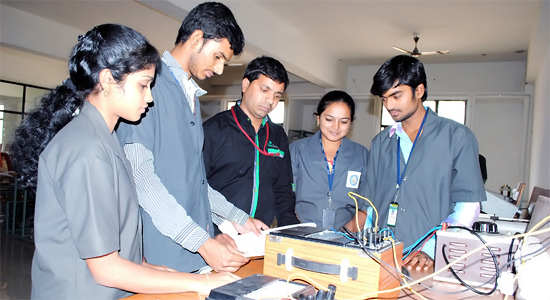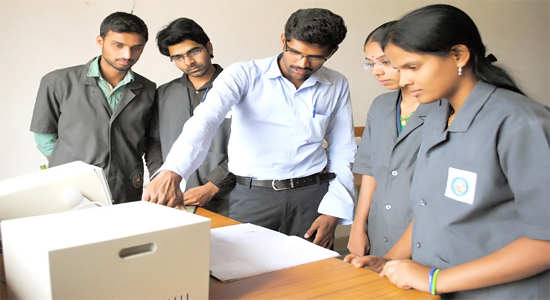Vision
To excel as a centre of Technical Excellence in the field of Electronics and Communication
Engineering.
Our Mission
To nurture the young minds with quality technical education and skills by adoptingLearner -Centric
approachesin the field of Electronics and Communication Engineering.
Electronics and Communications Engineering
PROGRAM EDUCATIONAL OBJECTIVES (PEOs):
- To provide the students with a strong foundation in the required sciences in order to pursue studies in Electronics and Communication Engineering.
- To gain adequate knowledge to become good professionals in electronic and communication engineering associated industries, higher education, and research.
- To develop attitude in lifelong learning, applying, and adapting new ideas and technologies as their field evolves.
- To prepare students to critically analyze existing literature in an area of specialization and ethically develop innovative and research-oriented methodologies to solve the problems identified.
- To inculcate in the students a professional and ethical attitude and an ability to visualize engineering issues in a broader social context.
PROGRAM SPECIFIC OUTCOMES (PSOs):
- PSO1: Design, develop and analyze electronic systems through application of relevant electronics, mathematics and engineering principles.
- PSO2: Design, develop and analyze communication systems through application of fundamentals from communication principles, signal processing, and RF System Design & Electromagnetics.
- PSO3: Adapt to emerging electronics and communication technologies and develop innovative solutions for existing and newer problems.
ROLE OF ELECTRONICS AND COMMUNICATION ENGINEER:
Electronics and Communication Engineers are integral to the development and maintenance of modern technology. Their contributions span from the initial concept to the final product, ensuring functionality, reliability, and compliance with industry standards. Here is a comprehensive overview of their key roles and responsibilities:
- Engage with clients to discuss and refine proposals.
- Design new systems, circuits, and devices or enhance existing technologies.
- Innovate and refine existing circuits and systems to enhance performance and efficiency.
- Conduct testing of theoretical designs.
- Write detailed technical reports and specifications.
- Follow the development process with precision.
- Develop user-friendly interfaces.
- Ensure compliance with safety regulations.
- Plan and manage projects.
- Prepare and manage budgets.
- Supervise technicians, craftspeople, and other team members.
- Systematically improve the design and details of electronic equipment.
- Ensure all designs comply with industry safety standards and regulations.
Electronics and Communication Engineers are crucial in driving technological progress and innovation. Their work enhances the efficiency and functionality of modern devices and systems, improves connectivity, accessibility, and the quality of life, and contributes to the overall advancement of society.
By integrating these roles and responsibilities, Electronics and Communication Engineers ensure that technology meets the demands of a rapidly evolving world, making them indispensable in various sectors including telecommunications, healthcare, defense, entertainment, and information technology.
CAREER PROSPECTS:
The graduates of ECE can look forward to a promising future with opportunities in various roles across diverse industries:
- Electronics Engineer, Electronics and Communication Engineer, Electronics Design & Development Engineer, Desktop Support Engineer, and System Control Engineer are some potential roles.
- Industries include Robotics, Automotive, Telecommunications, and Electronic Equipment Manufacturers.
- Emerging Fields: ECE graduates can explore opportunities in emerging fields such as Internet of Things (IoT), Artificial Intelligence (AI), and 5G/6G technology development.
- Research roles are available in both academic and commercial research establishments.
- Public sector opportunities span Civil Service, Local Authorities, Hospitals, and Educational Institutions.
- Positions in Government Departments, such as the Ministry of Defence, Telecommunication departments are also viable.
- Non-electrical organizations provide roles focused on implementing and maintaining computer systems, telecommunications, and technical equipment.
- Cross-disciplinary Collaboration: ECE professionals collaborate with experts from diverse fields like software engineering, mechanical engineering, and data science to develop integrated solutions.
FACULTY DETAILS
| S.No. | Name | Faculty Type | Designation | Experience |
|---|---|---|---|---|
| 1. | Dr. JEYARANI A D | Regular | Asst. Prof. | 21 yrs 8 months |
| 2. | Mrs. JANET SOPHIA M | Regular | Asst. Prof. | 5 yrs 7 months |
| 3. | Mrs. SURYA L | Regular | Asst. Prof. | 5 yrs 7 months |
| 4. | Mrs. SHAMILI R | Regular | Asst. Prof. | 5 yrs 7 months |
| 5. | Ms. SUMATHI A | Regular | Asst. Prof. | 1 yr 3 months |
| 6. | Mrs. LILLY K PAULINE | Regular | Asst. Prof. | 10 yrs 6 months |
| 7. | Mrs. TREPHENA PATRICIA A | Regular | Asst. Prof. | 11 yrs 8 months |
| 8. | Mrs. ARUL ANGELINE A | Regular | Asst. Prof. | 2 yrs 9 months |
| 9. | Ms. WALANTINA E | Regular | Asst. Prof. | 1 yr 9 months |
| 10. | Mr. PADMANATHAN T | Regular | Asst. Prof. | 5 yrs 11 months |






